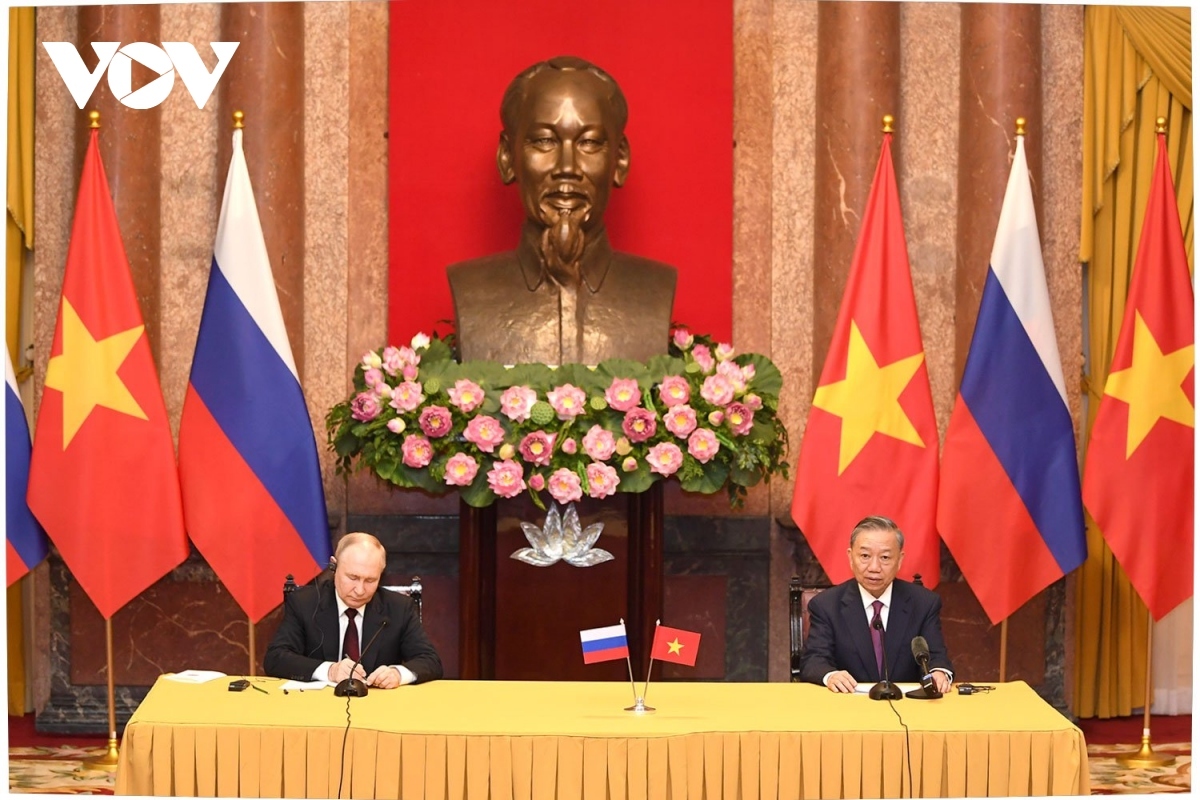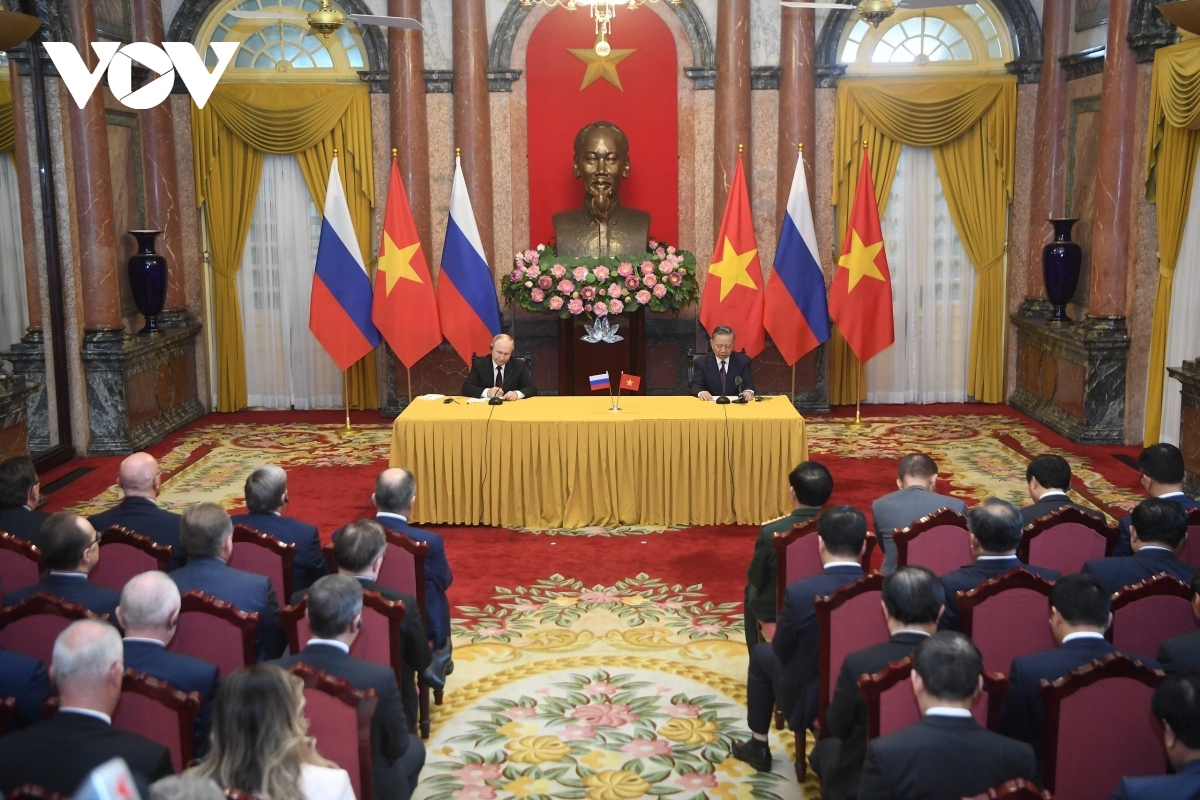Vietnam, Russia agree on major strategies to reinforce comprehensive strategic partnership
VOV.VN - Vietnamese President To Lam and Russian President Vladimir Putin have agreed upon major strategies to further enhance the comprehensive strategic partnership between Vietnam and Russia.

The two State leaders co-chaired a joint press briefing in Hanoi announcing the outcomes of their official talks.
President Lam underlined the significance of President Putin’s visit, coinciding with the 30th anniversary of the signing of the Treaty on Principles of Friendly Relations between Vietnam and Russia (June 16, 1994-2024).
He affirmed Vietnam’s commitment to an independent, self-reliant foreign policy, multilateralism and diversification and being a reliable partner and responsible member of the international community, for the sake of peace, stability, cooperation in the world.
Russia is always a "priority" in Vietnam’s foreign policies, he said, while laying stress on the intention to solidify a long-standing traditional friendship and cooperation with Russia, recognizing the historical support from the formerly Soviet Union and Russia.
Host and guest highlighted the success of their talks focusing on bilateral cooperation and issues of shared concern aimed at national development and regional and global peace and cooperation.
The leaders concurred to boost ties based on mutual trust, equality and non-interference in each other's internal affairs, adherence to the United Nations Charter and international law.
They pledged not to form alliances or enter agreements with third parties that could harm each other's independence, sovereignty and fundamental interests and not to act against any third party, while offering mutual support and contributing to regional and global peace.
On political and diplomatic fronts, the two nations decided to consolidate political trust through increased exchanges and cooperation across various channels, including Party, state, government, parliamentary and local levels. There will be increased exchanges between generations, especially among the youth.
Economic cooperation remains a cornerstone of the comprehensive strategic partnership. The two sides consented to effectively carry out and accelerate negotiations to enhance the free trade agreement between Vietnam and the Eurasian Economic Union (EEU).
They aim to overcome adverse global economic challenges to intensify bilateral trade and investment, support key energy and oil projects and facilitate the two countries' expansion of business and investments, in line with national laws, and international law, especially the 1982 United Nations Convention on the Law of the Sea (UNCLOS).
The two sides also concurred to expand cooperation in new energy, clean energy, green transition and sustainable development research.
The leaders expressed a desire to step up defence and security cooperation to deal with non-traditional security challenges, on the basis of international norms and laws as a contribution to regional and global peace and security.
In the fields of transport, science and technology, innovation, education, vocational training and labour, both sides agreed to strengthen collaboration to drive economic growth.
They also underscored the need to promote cultural and artistic exchanges and people-to-people ties, especially among the younger generations.
Both nations agreed to facilitate the life, work and study of Vietnamese citizens in Russia and Russian citizens in Vietnam, helping them serve as bridges of friendship between the two countries.
Regarding regional and international issues, Vietnam and Russia supported building a democratic, fair and transparent international relations system based on international law and the UN Charter without using or threatening the use of force, settling disputes peacefully, and promoting a "new, expanded, transparent, inclusive, non-discriminatory multilateral trading system."
They embraced an inclusive, undivided Asia-Pacific regional structure based on international law; and enhanced economic linkages via APEC, G20, Asia-Europe economic cooperation frameworks.
Vietnam also welcomed Russia’s cooperation with the Mekong sub-region for regional and global peace, stability and prosperity.
Regarding the South China Sea (known in as the East Sea in Vietnam) issue, the two sides underscored the maintenance of maritime and aviation security and freedom, refrainment from violence or threats of violence and resolution of disputes with peaceful measures in line with the UN Charter and international law, especially UNCLOS 1982.
The two countries backed the full implementation of Declaration of Conduct of Parties in the South China Sea (DOC) and the negotiations towards an early, substantive and effective Code of Conduct of Parties in the East Sea (COC) in accordance with international law.
On this occasion, the sides have approved a joint statement on deepening the comprehensive strategic partnership between the two countries.
Reflecting on the shared history and the upcoming 75th anniversary of diplomatic relations in 2025, President Putin recalled the significant support from the Soviet Union in helping Vietnam overcome challenges and build economic, infrastructure and educational institutions. He highlighted the 30th anniversary of the Treaty on Basic Principles of Friendly Relations, saying that the treaty serves as a foundation for the bilateral relationship.
President Putin hailed the productive talks, noting detailed discussions on key development directions and international and regional issues, with a focus on economic and trade cooperation.
President Putin highlighted the increasing use of local currencies in bilateral transactions, with 40% of trade in 2023 and 60% in the first quarter of 2024, facilitated by the Vietnam-Russia Joint Venture Bank, which has operated for 20 years.
He also hailed energy cooperation, particularly the success of the Vietsovpetro joint venture over the past four decades.
Prior to the press briefing, the two leaders witnessed the signing of 11 cooperation documents covering education, nuclear technology research, disease prevention, oil exploration, justice and sports.




